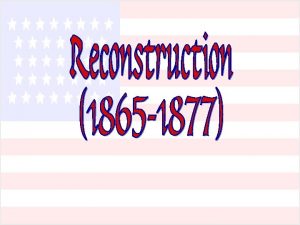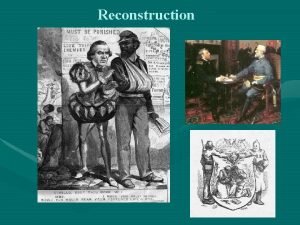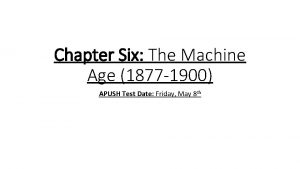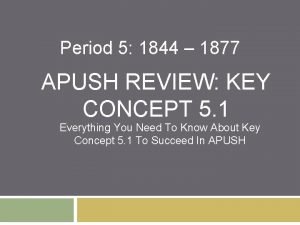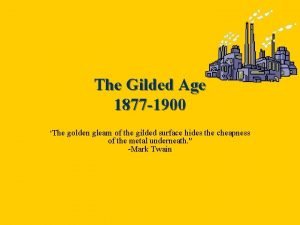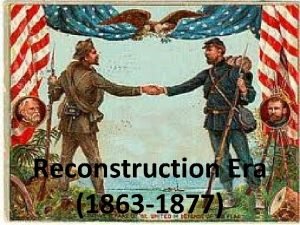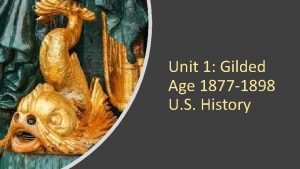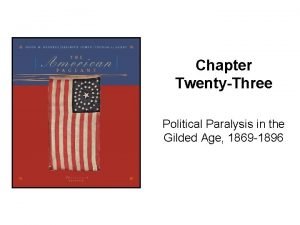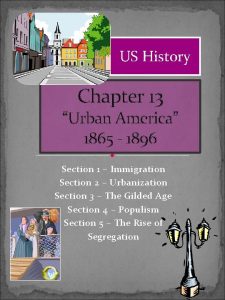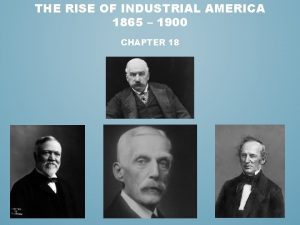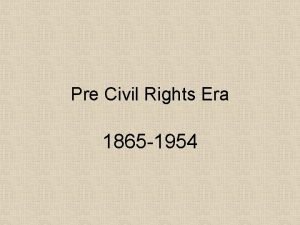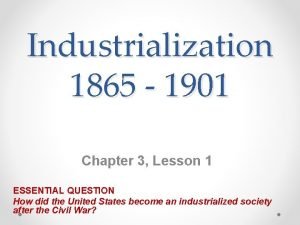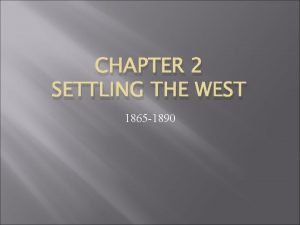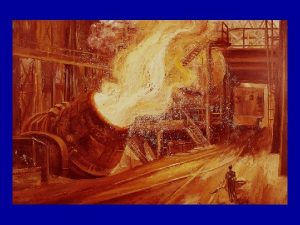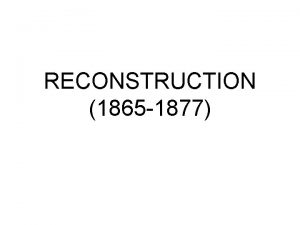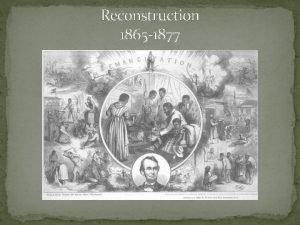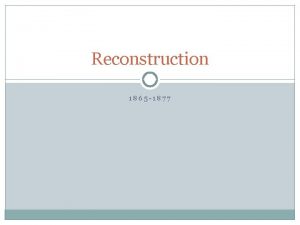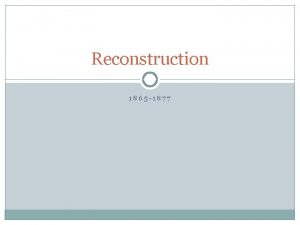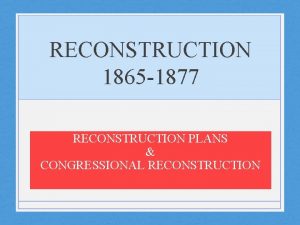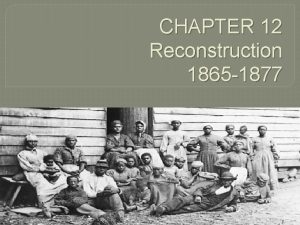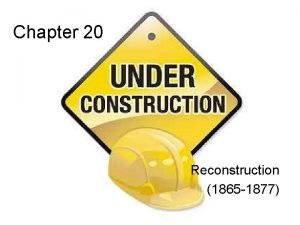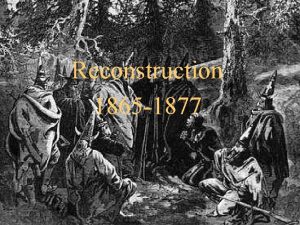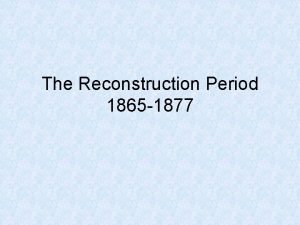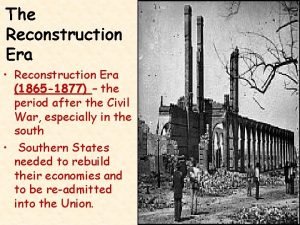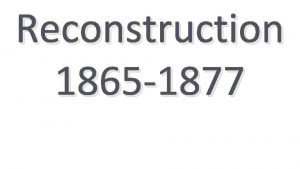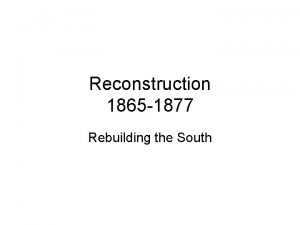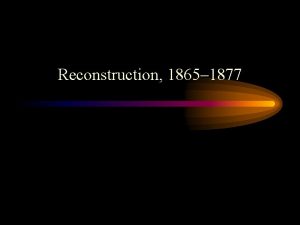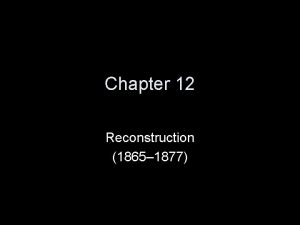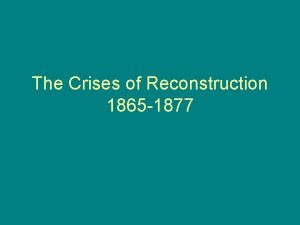Reconstruction 1865 1877 Reconstruction Refers to the time





























- Slides: 29

Reconstruction 1865 -1877

Reconstruction • Refers to the time from the end of the Civil War to 1877 • Focused on abolishing slavery • Destroying all traces of the Confederacy • “reconstructing” the South and the constitution • Lincoln’s 10% Plan abandoned upon his death •

Reconstruction State White Citizens Freedmen SC 291, 000 411, 000 MS 353, 000 436, 000 LA 357, 000 350, 000 GA 591, 000 465, 000 AL 596, 000 437, 000 VA 719, 000 533, 000 NC 631, 000 331, 000

Reconstruction Amendments • 13 th, 14 th and 15 th Amendments passed b/w 1865 -1870 • 13 th – Abolished slavery (1865) • 14 th – Defines citizenship and requires states to offer equal (1868) protection under the law to all persons • 15 th - granted voting rights regardless of "race, color, or previous condition of servitude". (1870)

Black Codes • Series of state laws passed in South after the 13 th Amendment that attempted to limit the civil rights of blacks • Freedmen were free, but not yet citizens • Attempt to control blacks and ensure they didn’t achieve social equality or the vote • Tried to guarantee black labor - sharecroppers • Angered the North, saw it as quasi-slavery • Helped usher in Radical Republicans in 1866 Congressional elections

Sharecropping

Tenancy and Crop Lien System Furnishing Merchant Tenant Farmer Landowner ▪ Loan tools and seed ▪ Plants crop, harvests ▪ Rents land to tenant in up to 60% interest to in autumn. exchange for ¼ tenant farmer to plant to ½ of tenant farmer’s spring crop. future crop. ▪ Turns over up to ½ of crop to land owner as ▪ Farmer also secures payment of rent. food, clothing, and other necessities on ▪ Tenant gives credit from merchant remainder of crop to until the harvest. merchant in payment of debt. ▪ Merchant holds “lien” {mortgage} on part of tenant’s future crops as repayment of debt.

Andrew Johnson (1865 -1869) • 17 th President • Appointed white governors of southern states • Favoured quick readmission of Confederate States to the Union • Vetoed Civil Rights Act of 1866

Civil Rights Act of 1866 • Passed to counter the Black Codes and protect right of Freedmen • Included right to sue, make contracts and own private property • Johnson vetoes bill because blacks are not citizens and felt bill favoured blacks over whites • Radical Republicans override veto

Radical Republicans • Radical Republicans wanted equal rights for Freedmen (newly freed slaves), harsh terms for ex-Confederate States • Controlled both House and Senate w/ 2/3 rds majority (needed to override veto) • Passed series of laws over Johnson veto • Est. a series of military districts overseeing state governments

5 Military Districts

Impeachment • Radical Republicans clashed w/Johnson over his “too easy” approach to Reconstruction • Johnson pardoned many Confederate leaders/No treason trials • Edward M. Stanton, Sec. of War, was Radical Republican • Johnson attempts to remove Stanton who he saw as exceeding and abusing his authority – interfering in other departments, accusations of spying on Johnson

Impeachment • Replaces Stanton w/ Adjutant Gen. Lorenzo Thomas • Violated Tenure of Office Act (1867) – president could not remove an appointee w/out the approval of the Senate • Senate refused to ratify the removal of Stanton, had Thomas arrested and moved to impeach Johnson

The Trial of Andrew Johnson • Trial held in the Senate • Chief Justice Salmon P. Chase presided • Final vote 35 -19 to impeach Johnson for violating the Tenure of Office Act • 2/3 rds majority needed to impeach • Johnson acquitted by a single vote

The Ku Klux Klan • • Est. 1865 by 6 Confederate veterans in Tennessee Most members were veterans – hierarchal organization Purpose to restore white supremacy Opposed to “carpetbaggers” (northerners who moved to the south during the Reconstruction to take advantage of the chaos and to make a quick buck) and “scalawags” (white southerners who supported the federal government) • Intimidated freedmen • Adopted violent methods but hid behind conical masks and white robes

The Ku Klux Klan • Hooded costumes meant to protect the anonymity of its members • Promoted fear of an “unknown” terror among blacks • Grand Wizard – Confederate General Nathan Bedford Forrest • Lynching

Lynching • Initial lynching focused on both black and white democrats • Threatened to lynch “carpetbaggers” • Used to prevent blacks from exercising right to vote and bear arms

President Grant (1869 -1877) • Popular w/ Radical Republicans for rejecting Johnson’s offer to replace Stanton • Favoured keeping a limited number of troops in the South to support Rep. governors, protect Freedmen, and put down the KKK, but not too many to create resentment in the South

The Civil Rights Act of 1871 • Southern governors unwilling to act against Klan violence • A. K. A. – The KKK Act • Grant passed act to combat the escalating violence • Objective was to protect southern blacks from the KKK by giving them a legal remedy • Whites seldom indicted and never convicted of lynching

The KKK Act • Federal troops used to enforce the law, not state militias • Klansmen could be prosecuted in federal court and judged by predominately black juries • Hundreds of Klansmen were imprisoned or fined • Effectively destroyed the Klan for 30 years

The Election of 1876 • Most intense and disputed election in U. S. history • Samuel J. Tilden (NY–Dem) • Rutherford B. Hayes (OH-Rep) • Tilden ran on platform of reform against backdrop of Republican corruption • Republicans: “Not every Democrat was a rebel, but every rebel was a Democrat. ”

The Election of 1876 • Tilden defeated Hayes in popular vote (51%-49%) • Tilden had 184 electoral votes to 169 for Hayes with 19 uncounted • 19 votes in dispute in Florida (4) Louisiana (8) and S. C. (7) • Both parties claimed victory, but the results in all three states were marked by fraud and intimidation of Republicans

The Election of 1876

The Election of 1876 • Forces Congress to rule on the outcome of the election • Constitutional crisis - Congress formed 15 member Electoral Commission • 5 Rep and 5 Dem from the House and Senate, plus 5 members of the Supreme Court (2 Rep/2 Dem and 1 Independent) Independent Justice David Davis resigned • Only Rep justices left – Joseph P. Bradley • Bradley joins other 7 Rep and in an 8 -7 decision awards all 19 electoral votes to Rep candidate Hayes

The Compromise of 1877 • Informal and unwritten deal that settled the disputed election • Southern Democrats would acknowledge Hayes as president if he gave in to their demand 1. Remove All Federal troops from the Confederate States 2. Appoint at least 1 Southern Democrat to his cabinet 3. Legislation to industrialize the South 4. Construct another transcontinental railway using the Texas and Pacific Co.

Rutherford B. Hayes (1877 -1881) • Hayes agrees w/ points 1 and 2 • Decision ends Reconstruction • “Solid South” – voted Democrat, almost w/out exception for the next 88 years • Compromise pushed blacks out of power in the government • What does this mean?

The Failure of Reconstruction • Southern Dem. Pass laws making voter registration and elections more restrictive • Disfranchised most blacks • Accomplished w/ series of poll taxes, literacy tests, residency and record keeping requirements, Grandfather clauses • Denied right to vote, blacks could not serve on juries or run for office, therefore their interests and concerns were ignored

Jim Crow laws • Local laws that mandated segregation of public facilities • Applied to train cars, restrooms, restaurants, theatres, and public schools • 1892 – law challenged by Homer Plessy (1/8 black) • Arrested for riding in “whites only” train car • Case went to the Supreme Court

Plessy v. Ferguson (1896) • 7 -1 decision • Upheld the constitutionality of segregation • Segregation was legal provided the facilities were equal • “separate but equal” • Problem was facilities were inherently unequal
 1877-1865
1877-1865 Reconstruction refers to the period
Reconstruction refers to the period Georgia history timeline 1877-1919
Georgia history timeline 1877-1919 Compromise of 1877 apush
Compromise of 1877 apush Compromise of 1877 apush
Compromise of 1877 apush Compromise of 1877
Compromise of 1877 Gilded age labor strikes
Gilded age labor strikes Whats the compromise of 1877
Whats the compromise of 1877 1877 golden 1
1877 golden 1 Tanssija 1877-1927
Tanssija 1877-1927 Define reconstruction era
Define reconstruction era The gilded age 1877 to 1898 worksheet answers
The gilded age 1877 to 1898 worksheet answers 1894 railroad strike
1894 railroad strike The key tradeoff featured in the compromise of 1877
The key tradeoff featured in the compromise of 1877 Urban america 1865 to 1896
Urban america 1865 to 1896 St helen’s smelting co v tipping (1865)
St helen’s smelting co v tipping (1865) The rise of industrial america 1865-1900
The rise of industrial america 1865-1900 Four features of industrial manufacturing (1865-1900)
Four features of industrial manufacturing (1865-1900) 15 th ammendment
15 th ammendment Lesson 1 the rise of industry
Lesson 1 the rise of industry Becoming a world power 1865-1917
Becoming a world power 1865-1917 Impressionism (1865–1885)
Impressionism (1865–1885) Chapter 20 becoming a world power notes
Chapter 20 becoming a world power notes Settling the west 1865 to 1890
Settling the west 1865 to 1890 Gregor mendel 1865
Gregor mendel 1865 How did renoir glamorize his clientele
How did renoir glamorize his clientele Regionalism in literature
Regionalism in literature Industrialization (1865 to 1901 worksheet answers key)
Industrialization (1865 to 1901 worksheet answers key) 1865 to 1900 inventions
1865 to 1900 inventions Elapsed time
Elapsed time
